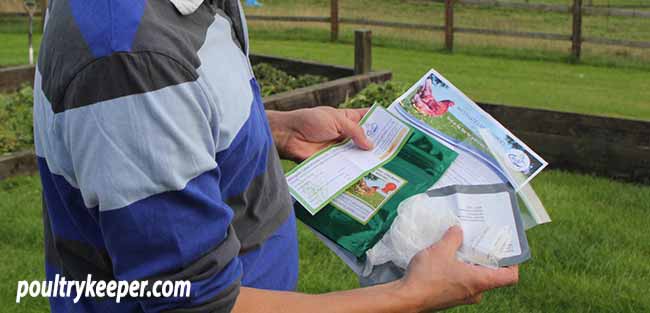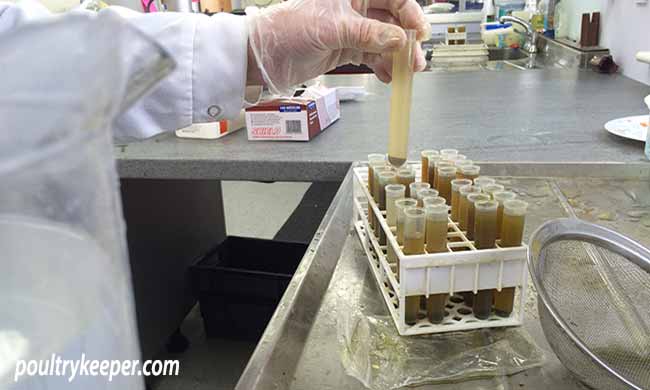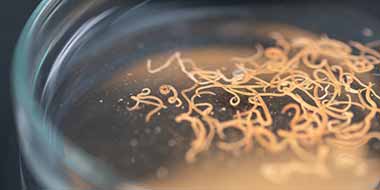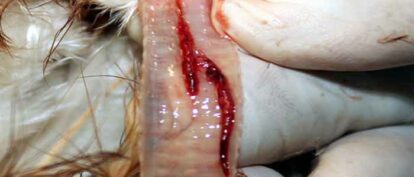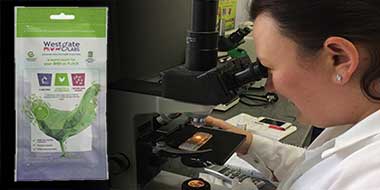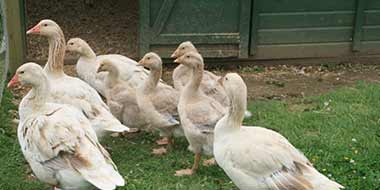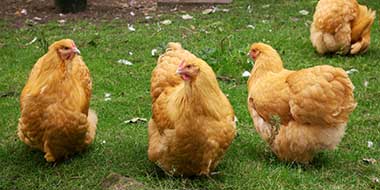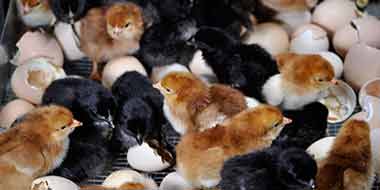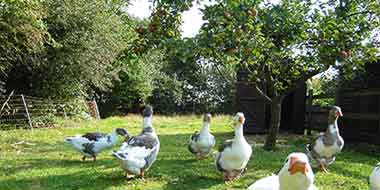
Ducks can carry worms, just like other poultry. Worming ducks (or de-worming, as some people say) is not difficult using a suitable worming product, but whether you need to worm ducks is often a question that comes up. This article tells you how to check for worms and how to worm ducks if necessary.
A good practice I followed was to worm my ducks twice per year routinely: once after they had stopped breeding (in the summer), and again before they started laying (at the end of winter); however, with antibiotic and drug resistance becoming a bigger problem in recent years it’s not advisable to worm ducks without first checking they need it.
With the availability of postal worm egg count kits (often marketed to backyard chicken keepers but suitable for all poultry), it is now possible to get a faecal egg count performed for a very reasonable price. This can help you avoid worming ducks indiscriminately, and more often than not, they won’t need to be given a wormer.
Many health problems can occur in ducks that ARE carrying worms, so I suggest testing your ducks for worms at least twice per year, ideally every 3 months.
Additional Reading:
It will help if you read my Ultimate Guide to Worming Chickens in conjunction with this page because most of the information it contains is common to all types of poultry. Still, this article is intended to give slightly more specific advice concerning worming ducks.
Worms that affect Ducks
These are the most common types of poultry worms that affect ducks:
- Roundworm – The most likely worm you will come across is found in droppings and sometimes can be seen with the naked eye.
- Gapeworm – Found in the trachea and lungs. They make ducks cough or shake their heads.
- Gizzard Worm – Found in the gizzard, mainly in geese but sometimes in ducks.
- Tapeworm – Found in the intestine, although fairly uncommon in ducks.
- Caecal Worm – Found in the Caecal tubes.
Signs & symptoms of worms in ducks
How to recognise a worm problem
Worms cause lots of damage to the digestive system, which can sometimes lead to death but certainly leads to increased feed consumption, fewer eggs, and gradual weight loss if nothing else.
These are common symptoms you may see if ducks have worms:
- Ducks are 'off their legs' or lame.
- Ducks are underweight.
- Coughing (often caused by gapeworms).
- Shaking of the head.
- A drop in egg production.
- Seeing worms in droppings (often roundworms).
- Blood in faeces / around the vent.
- Ducks look dull/sluggish, and quieter than usual.
Free-range ducks are more at risk
It is proven beyond doubt that worm loads in birds kept in free-range systems are far higher than birds kept in confined spaces. A classic sign of ducks having worms is that they will go off their legs or go lame. Duck faeces containing worms are picked up by ducks dabbling and feeding and transferred to intermediate hosts (such as earthworms) in the soil. Ducks eat the infected worms, and the cycle is complete.
Tip: Leg Weakness
If ducklings show leg weakness or a reluctance to walk properly, it's unlikely to be worms if they have been kept on clean ground. It can sometimes be a lack of Vitamin B. You can sprinkle a pinch of dried brewers yeast powder on their food for a few weeks as a supplement. Brewers Yeast is available online or in health food shops.
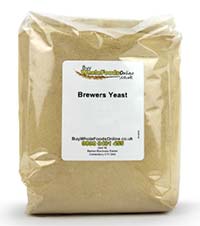
Breaking the cycle
If you get a positive faecal egg count, worming ducks is important to try to break this cycle. Good management is important, resting ground when possible and keeping grass short so that the ultraviolet from sunlight kills any worm eggs in droppings on the ground.
If your birds are carrying a lot of worms or your ground is well used, then it is usually necessary to repeat the wormer dose since birds will pick up more eggs from the ground. Do this at an interval when the worm-eggs are hatching but before they reach sexual maturity. For most worms that affect ducks, 3 weeks is a good time to repeat the treatment.
Impaction and toxins
If ducks carry too many worms, you can have a situation where impaction occurs – this is where a blockage caused by a large number of worms stops the digestive system from working correctly, killing the bird. If a duck carries a very high worm load, worming ducks can also release toxins into the body, which may kill the duck after you have treated it. There is little you can do in cases like this.
Getting A
Worm Egg Count
Using a worm count kit is relatively straightforward. There are gloves, a collection bag for samples and a pre-paid envelope. The worm count takes place in a lab under a microscope, and the result is returned by email advising you of the number of eggs and whether you need to worm your ducks.
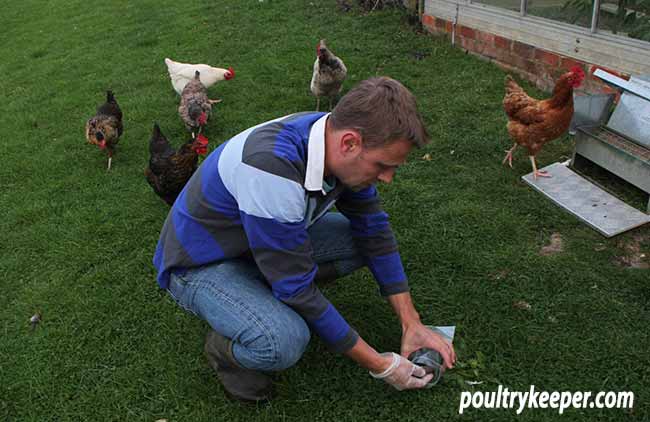
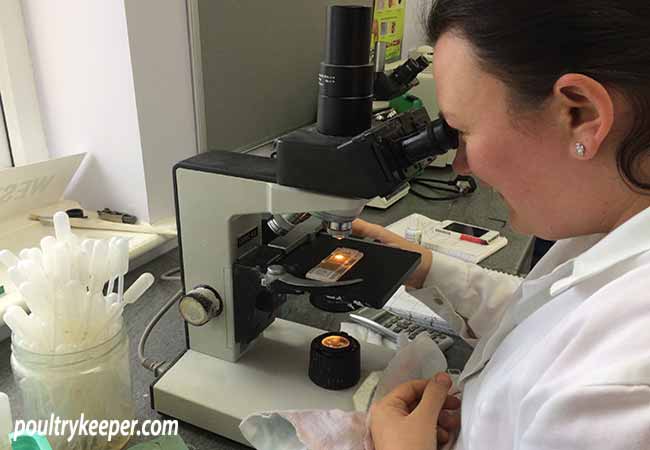
Products for worming ducks
How to worm ducks
There are no products to my knowledge that are licensed for use with ducks in the UK. This is not to say there aren’t products available that will worm ducks!
Testing veterinary products to get them licensed is both expensive and time-consuming. When there isn’t much of a market commercially for this sort of thing, companies won’t find any reasons to get their products licensed.
Vets (in the UK) can, of course, prescribe products they feel are suitable under their own ‘clinical judgement‘, and waterfowl breeders have passed on knowledge of the products they use for worming over the years too.
Here are some of the most common wormers that I have heard vets are prescribing and are used by other waterfowl enthusiasts for worming ducks:
Flubenvet
There is no official dose for ducks. Most people will use the dosage given for Chickens and Geese. Note the dose rate will be different according to the pre-mixture you buy (one is stronger than the other), so check the label. If you are in any doubt, you should, of course, seek the advice of your vet.
Visit our page on Flubenvet here, where we also provide links to sellers of this product.
Ivermectin
Ivermectin has been prescribed to people by their vets for use on ducks. This is a ‘spot-on’ product, and it kills external parasites such as lice. Ivermectin is available in a small 10ml bottle that contains a dropper for easy application. The dosage rate for pigeons (remember it is unlicensed for ducks, so no official dosage is given. You will need to ask your vet for their advice) is 1 drop on the skin per 500g of bird weight weekly for 3 weeks.
According to my books, Ivermectin will not kill tapeworm, but they are very rare in ducks.
There are also oral Ivermectin products. Please take care if you decide to use them. They are stronger, and if you give ducks too much Ivermectin, it can kill them. The spot-on is a safer choice.
Visit our page on Ivermectin here for further information.
Take Care...
Remember to follow the safety advice from the manufacturer. Always wear rubber gloves when handling drugs. If you are in ANY doubt, then please seek the advice of your veterinarian.
Verm-X
Verm-X – This is a 100% natural product that many people are now using. I have been using this for the last couple of years as part of a more holistic approach; however, I also get a worm count using a Westgate Labs Worm Count Kit.
Read a review on Verm-X here.
There are some other natural products that we can use to help prevent worms in ducks. Without getting into the do they work? debate (I wrote about Natural Methods of Worming in the Ultimate Guide to Worming Chickens which applies to ducks), the approach I have taken is to use a worm count kit at least twice per year. That way, if you decide to follow a holistic approach, you can be sure it’s working and only use a chemical wormer if it’s necessary.
Whatever approach you take to worming ducks, I hope this article has given you some food for thought!

